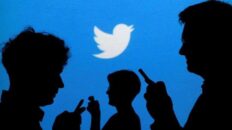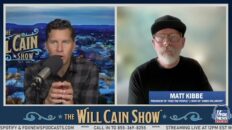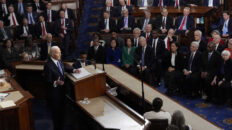Federal Reserve Chair Janet Yellen is expected to announce an increase in interest rates one quarter of one percent, with further increases not too far behind. Don’t everybody panic at once.
Displaying a characteristic combination of economic ignorance and fear mongering, Politico is portraying this decision as directly contrary to the nation’s prosperity, arguing that rate increases will cause a stock market crash and a recession in one fell swoop. But while both those things are pretty likely to happen in the near future, it won’t be because of higher interest rates. Quite the opposite.
It’s important to understand that the Federal Reserve has been artificially holding down interest rates for a decade, in a misguided effort to speed the recovery from the Great Recession. When Yellen now says she intends to raise rates, this is not an interventionary action; it’s merely a rolling back of the rampant money creation that has gone on unchecked for so long.
This is a good thing. Pumping cash endlessly into the economy does not create wealth, prosperity, or jobs. And it certainly does not create stability. What it does is cause prices to rise and investors to make bad decisions they otherwise wouldn’t have made. In the short run, all this extra money getting spent may look like a thriving economy, but it is only an illusion that must sooner or later come to painful end.
So what happens when the Fed finally stops pumping money into banks? A couple of things. First, yes, it’s true, we may see declines in the stock market, but the reason for this is entirely sensible. Investors always want the best return on their money. When interest rates are zero, as they have been for so long, your best chance to make money is to buy stocks and hope the prices go up. When lots of people do this, the stock market as a whole goes up, and people who watch the Dow Jones get excited. When interest rates are higher, however, investors find they can make money in safer, less speculative ways, and shift some of their funds from stocks to interest bearing accounts. When this happens en masse, the stock market goes down, and Dow Jones enthusiasts get unhappy.
But the stock market is not the economy. Let me repeat that: The stock market is not the economy. The economy consists of the goods and services people produce — goods and services, which are in no way harmed by people moving from one class of investments to another. So if the Dow Jones dips a bit after a Federal Reserve rate hike, don’t panic. That’s normal.
Now, let’s move on to this recession business. Politico points out that more often than not, rate hikes are accompanied by recessions. This is no doubt true, but to conclude from this that high interest rates cause recessions is to commit that most unpardonable of social science fallacies: Correlation is not causation.
In other words, just because two things happen together, doesn’t mean that one causes the other. Every morning I make a cup of tea as the sun rises. But the sun does not cause me to make a cup of tea, anymore than my making it causes the sun to rise. Correlation is not causation.
The reason for the correlation between rate hikes and recessions is that rate increases typically come after long periods of expansionary policy, when the Fed has been artificially holding rates down with loose money. This easy money results in distorted market signals that lead to bad investments. It is these bad investments that sow the seeds of recession.
It is only at the point when expansionary monetary policy becomes unsustainable that rate hikes come, at which point the bad investments begin to bear their poisonous fruit. In short, rate increases precede recessions because they mark the end of the Fed’s ability to maintain the illusion of growth.
The Fed cannot keep rates down forever, and the longer it tries to, the worse the fallout will ultimately be. People think that holding rates down keeps the economy healthy, so we should do it as long as possible, but in fact, it merely magnifies the distortion and creates greater instability. Rates must rise, and they should rise sooner rather than later. It’s already substantially too late to avoid a recession, but there is nothing to be gained by prolonging the inevitable.
As with so many things in economics, common sense can be relied on to a heavy extent. It’s insane to say that the only way to prevent recession is to endlessly pump money into the economy. That much should be obvious to anyone who can be bothered to think about it in terms divorced from political spin and bureaucratic rhetoric. Now, if only it were obvious to central bankers, the world would be a lot better off.
This article originally appeared on Conservative Review.














Add comment